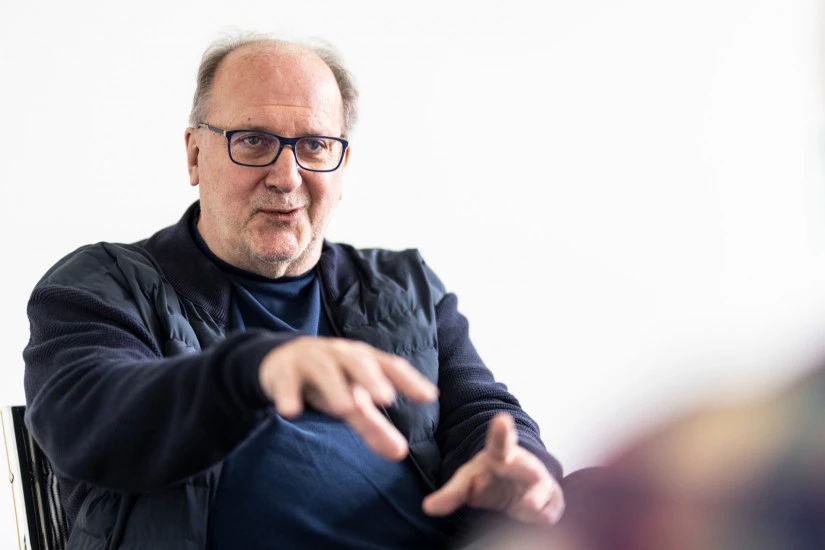Pénzcentrum: What is your opinion about the current Hungarian higher education system?
Dr. László Láng: Higher education is a highly conservative industry all over the world. And it is this trait that is going to bring it down. Huge changes are taking place in the world, but HE institutions act as though they could muddle through unaffected. For example, everyone is concerned about artificial intelligence right now, but HE is primarily preoccupied with safeguarding copyrights and preventing students from plagiarising using AI. As if there is any distinction between preparing essays and theses using ghost-writers as currently or ChatGPT. The aspect of student assessment is considerable import but more important is how the AI affects the entire institutional and even system-level operation.
Furthermore, our academic world also believes in the perpetual value of degrees and diplomas it awards. This belief is wrong... I do not talk about science, engineering and medicine but I do talk about the disciplines that are part of IBS’ activities, i.e., economic, business, and social science education. In recent years, the market value of these degrees has fallen noticeably. Companies are less and less inclined to demand a certificate because they think that if an applicant has the necessary skills and attitude, they can teach him the rest. This is inconsistent with how higher education sees itself and the value added it allegedly provides. Employers want employees who can absorb and use the knowledge and skills required in the organization. They want co-workers who can think critically, analyse, write, talk, process, and assess data while working in teams, especially in English. This is not necessarily identical with the value proposition most of Hungarian HE is willing and able to offer at present.
The institutional system of higher education has been in existence for more than 800 years and has undergone few major modifications. The changing environment will bring it crumbling down. I claim that in 15 years, higher education as we know it will not exist. I am not talking about the Oxfords and Harvards of the world but of all the rest.
How different is the situation of IBS from the other domestic higher education institutions?
In Central-Eastern Europe, state-owned higher education has been reluctant allowing outside players into its domain. The end of the communism has brought some changes but there is still a lot of animosity toward commercial actors in HE. For instance, there are currently a lot of private universities in the model-state of our HE, i.e., in Germany, but in Hungary I only see a very tiny number of schools that are both independent institutions and can run without public funding. IBS is exactly like that; we have never requested or received funding from the taxpayer. We have been a pioneer in domestic higher education for 32 years; we are entirely market-based and operate only on tuition fees.
How great is the rivalry for teachers?
There is fierce competition for the qualified professionals who can teach in English because there are few of them. My fundamental belief is that no one should teach at a business school if they have no relevant professional experience, i.e., never left the confines of a university. Naturally, this is a circular argument; just because someone is a highly skilled professional does not automatically imply that they can teach at the level we need. We were happy to be able to bring in real stars from actual business, but it often turned out that they are unable to deliver to students.
Good IT people are especially difficult to find. They work for international companies for salaries that cannot be afforded by a HE institution. And if they are fed up with the corporate environment, they go to start-ups, become freelancers, or change career. Very few people aspire to become a teacher. And even fewer get a PhD, and in Hungarian higher education, the law prescribes what percentage of instructors must have a doctorate. IT specialists are not PhD-types, but neither are accountants and controllers.

How many professors are foreign and Hungarian at IBS?
The percentage of foreigners is between 15 and 20%. However, we have more or less run out of qualified Hungarian instructors available in Hungary. We recently began hiring people from abroad.
Even overseas, perhaps?
Oh yes. For instance, we are now in talk with potential IT instructors in Pakistan and India. Most of our current international instructors are expatriates, married to Hungarian partners, who chose to become teachers after finishing their business careers in their homeland. They also demonstrated that they were qualified for this job and that is not easy to do in our institution.
Anyone who claims they want to teach at IBS, must first try actual teaching in front of my colleagues regardless of their experience, academic standing, or political clout. We have encountered some extremely unexpected situations, and we frequently chose not to collaborate. If we decide that we are fit for one another, a multi-level training phase starts during which we assist the colleague to be to adopt our beliefs and values.
How does your approach to teaching differ from that of other domestic higher education institutions?
We simply cannot accept a clever scholar giving a lecture, showing around a set of slides to express his extremely clever ideas, and then leaving the classroom. Because such frontal teaching is we think the least effective method of instruction, however cost effective. We have abolished lectures as a mode of delivery.
We leave the students with the responsibility of processing the background materials at home. They independently review, listen to, or read the varied materials they are given, and then in class we expand on the knowledge they have already learned. In a seminar context, all of this is done in small groups in an interactive manner. In Hungary, many students finish their traditional university degrees without even opening their mouths, save during an oral exam. What will transpire at their initial job interview? This style of knowledge processing works well for the interaction that takes place in a classroom. They ought to communicate, reflect, think critically, practice civilized argumentation, stand up for themselves, and find solutions to issues. Frontal education does not foster such interactions. Nonetheless, these are precisely the skills that higher education should play a key role in developing.
How many graduates reside abroad?
It is quite challenging to quantify this, especially given that 60 percent of our students are international to begin with. Although the bulk of them return home, it is a positive development that more and more of our international students can work in Hungary even if they do not speak Hungarian. Even work placement was not possible ten to fifteen years ago. Every year, we have two job fairs on our campus for students and alumni, where a lot of them land jobs.
I guess these are multis, SSCs.
Yes. People with the skill sets they require come from IBS. According to our understanding, which is certainly statistically non-representative, around half of the Hungarian students who graduate from our programs will find employment at multinationals, where their majority makes good progress career-wise Another 15-20% continue their study, while another 15-20% join a family business or launch their own start-ups. The remainder goas abroad.

How did the number of applicants develop after Brexit?
The British shot themselves in the foot with Brexit in the field of education, in the same way they did in other domains. The UK was the most popular destination for Hungarian students. After the Brexit when British tuitions skyrocketed and student loans were no longer provided, students longing to study abroad first tried the Netherlands, but the country is now overcrowded, they don't want additional foreign students, there is insufficient housing. Denmark is still reasonably competitive, although living expenses are very high there. Given that, we offer top-quality British education at a Budapest location, making in part up for the lost opportunities. We provide the same quality, competitive environment, similar tenor, and standards as a British university. Our primary attraction is the high-quality British degree, which continues to have an unconditional world-wide acknowledgement.
What may be the cause of this when we already discussed how even the existence of a diploma in some scientific subjects is debatable?
Because the British education system is well-designed, highly individualized, very student-centred, and does not prioritize mass education in institutions like ours. It is the tailor-made professional development of students and the emphasis in critical analysis, written and verbal perfection that prevents British degrees from losing in value as much as others do.
How did the cost of tuition change during the recent financial crises, and how much did you have to change? How much does getting a degree here presently cost?
Naturally, we are experiencing the same cost inflation as any industrial actor. Our lease is increasing, and we cannot afford real income losses as concerns our staff and faculty. In contrast, we are unable to raise our tuition fees without losing market share. The cost of a three-year bachelor's degree is twenty-two thousand euros, or roughly eight million HUF at the current exchange rate. This, however, still represents only around 45-50% of the tuition of even the more affordable programmes in the UK.

Even if it occasionally happens, 1-1 domestic universities do not typically perform well in prestigious international rankings. How significant do you think this is? Is it even feasible to conclude that a facility is a suitable environment for pupils using empirical data?
The University of Buckingham, one of our partners in England, was the country's first private institution in the 1970s and owes its existence to Margaret Thatcher. The Times makes one of the most well-known rankings among the 140 higher HE institutions in Britain, and the Buckingham shows up only in the midfield at 40-50. This fact tells us little about their actual quality but more about the adopted methodology of ranking. One factor among five in THE ranking is how much governmental research funding a certain university can secure. Buckingham, however, receives zero funding because it is a private institution. They would easily rank in the top 10 if this factor weren't measured.
Of course, research outcomes and the number of Nobel laureates a certain institution has produced are significant factors, but not every university aspires to be a research institution. Many people "just" desire high-level teaching.
And although university colleagues tend to stonewall me for this, I don't see the direct connection between the quality of research and the quality of teaching, neither at the individual nor at the institutional level.
Why would a professor whose focus is on research teach anything better, let alone subjects unrelated to his specialized, limited area of study than other, no less experienced but less research-focused tutors? Although we have in our ranks individuals who conduct very high-quality research, which we much appreciate, our main goal is to be a high-quality institution for teaching and skills development.
We began our interview by discussing the situation of college education now and the prediction that in 15 years, we won't essentially even be familiar with it. But after that, how will things be, and what can we anticipate in the coming years?
The years ahead will undoubtedly be exciting. My favourite example is language teaching and language diplomas and certificates. You start learning a language somewhere, on your own, or with web-based facilitation, or with a teacher in groups or individually. You may be changing locations and methods. And when you feel prepared, you visit an accredited centre for language exams where you are awarded the respective certificate. Or you are not. In other words, teaching and learning and assessment have split into two and are not tied to a single institution. The credit system in higher education has made attempts to loosen up, introduce more flexibility and diversify away from one single HE institution, but the two, i.e., teaching and learning and degrees still go hand in hand. The student enrols in a school, completes their coursework there, is assessed there, and earns a diploma or a degree from the same school.
The future is more like what happened with language education: if you prove your knowledge and skills, you can get a certificate regardless of where or how you acquired those. Individual learning is getting more and more attention, and AI is only accelerating this trend. Higher education institutions if able at all will transform, in my opinion, into educational support institutions or facilitators, giving students far more freedom to choose when and what to study.
For the time being, higher education merely teaches the concept of creative destruction; students are not encouraged to experience it. I believe that this will result in the “creative” destruction of the global higher education system as we now know it must first come to an end before something better, more creative, more liberating may arise from it.
Text: Pénzcentrum.hu, Attila Bíró
Pictures: Ákos Kaiser, Pénzcentrum.hu
Translation with the permission of Pénzcentrum.hu: IBS
For the original interview in Hungarian, visit the link below.
